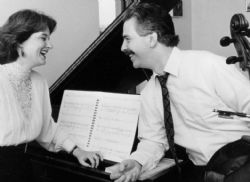|
Symphony
SRS SEASON ENDS WITH RESOUNDING TA-TA-TA-BANG
by Terry McNeill
Sunday, June 1, 2025
Symphony
YOUTHFUL VIRTUOSITY ON DISPLAY AT USO'S MAY CONCERTS
by Peter Lert
Saturday, May 17, 2025
Symphony
MYSTICAL PLANETS AND LIVELY GERSHWIN ORTIZ AT FINAL SRS CONCERT
by Peter Lert
Sunday, May 4, 2025
Symphony
VSO'S CONCERT MUSIC OF TIME, MUSIC OF PLACE
by Peter Lert
Sunday, April 27, 2025
Choral and Vocal
VOCAL ELEGANCE AND FIRE AT THE 222'S RECITAL APRIL 26
by Pamela Hicks Gailey
Saturday, April 26, 2025
CANTIAMO SONOMA SINGS AN INSPIRED GOOD FRIDAY MOZART REQUIEM CONCERT
by Pamela Hicks Gailey
Friday, April 18, 2025
DRAMATIC SHOSTAKOVICH SYMPHONY CLOSES PHILHARMONIC'S 25TH SEASON
by Terry McNeill
Sunday, April 13, 2025
LARGE COLLEGE OF MARIN AUDIENCE GREETS STOPHER ARTISTRY
by Terry McNeill
Saturday, April 5, 2025
Chamber
FRISSON DELIVERS SHIVERS OF DELIGHT
by Abby Wasserman
Sunday, March 30, 2025
OLD AND MOSTLY NEW IN SRS MARCH CONCERT IN WEILL
by Peter Lert
Saturday, March 22, 2025
|
 |
 The Fischer Duo |
FISCHER DUO CAPTURES BEETHOVEN'S MANIFOLD MOODS IN OCCIDENTAL RECITAL
by Joel Cohen
Saturday, January 29, 2011
The Redwood Arts Council presented two concerts of Beethovenís music for cello and piano at the Occidental Center for the Arts January 29 and 30, ably performed by the Fischer Duo - cellist Norman Fischer and pianist Jeanne Kiernan. Included were the five cello sonatas, plus two sonatas originally written by Beethoven for other instruments, his Horn Sonata in F, op 17, and his arrangement of the Op. 3 String Trio. The three sets of variations which Beethoven wrote for this instrumental combination were not programmed, but the opportunity to hear the two lesser known works for the ensemble was worth the pass on the variations.
The Jan. 29 recital began with the Bonn masterís first Sonata in F, Op. 5, No. 1. Mr. Fischer prefaced each concert half with spoken program notes, alluding to the influences causing Beethoven to write those pieces, and was an interesting way to understand them in the context of his life. For the first Sonata, he spoke of Beethoven being invited to visit the court of King Friedrich Wilhelm II of Prussia, where the Duport brothers, both accomplished cellists, were there to perform for Beethoven. This point helps us to understand why he chose to write virtuoso pieces for the cello, which had been substantially neglected as a solo instrument by the leading composers of the previous decades. He also wrote virtuoso piano parts, to be played, of course, by himself.
The Fischer duo proceeded to play an elegant, stylish performance of the work. It was enjoyable to hear their fine playing and ensemble work without any extraneous histrionics that often accompany better known performers. The next work on the program was the C Major Sonata, Op. 102, No.1, written at the beginning of what came to be known as his late period. This juxtaposition brought out some of the stylistic changes that occurred in Beethovenís writing through his life, where in his earlier works he was apt to write in sudden accents almost for their shock value, in his later music he would write entire alternating phrases, first loud and forceful, then suddenly delicate and sweet. The duo took all his sudden changes of character in stride, bringing out the inner beauty of the lines when appropriate, and the fire and brimstone of the forceful passages.
After the intermission, they presented the little known (in this form) Sonata for French Horn, Op 17. Although Beethoven did in fact arrange this piece for cello, it still showed many of the limitations of writing for the natural horn, such as not modulating far from the home key, and time between phrases for the horn player to rest. There was far less of the give and take between the piano and the cello found in the pieces written specifically for this combination. It was also reminiscent of the earlier Classical period where there tended to be a clear melody and a separate accompaniment, rather than the conversational aspects of the emerging romantic period. Although somewhat simpler in construction than the other works, the duo performed this work with great verve.
The final work of the evening was the last sonata Beethoven wrote for cello, Op. 102, No. 2, in D major. Itís a dramatic piece, presenting manifold ideas, as opposed to the C Major Sonata, which is far more intimate, conversational and humorous (in the last movement). The D major is the only cello sonata by Beethoven with a fully developed slow movement. This reviewer was quite surprised to realize how much Richard Strauss was influenced by and borrowed from this movement to write his early Sonata in F, Op. 8. The playing of the Fischer Duo was here as fine as throughout the evening, with probing insight into Beethovenís changing moods. They obviously take great delight in illuminating the compositions with sensitive playing and fine ensemble.
The full house in the new Performing Arts Center provided a standing ovation.
Joel Cohen is a virtuoso cellist living in Mendocino County.
|
